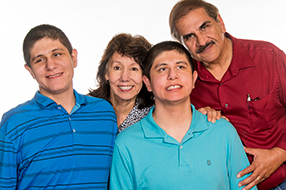
June 15, 2015 | By: Christopher Currin
Categories: Insurance & Financial Help, Family Support
Navigate Life Texas works to maintain the accuracy and integrity of the content on this site. This blog has been updated since its first publication to reflect changes with other organizations, links to other sites and other information. The substance of the article and the writer’s story have not been altered.
I became a certified financial planner in 1990. I became the father of a child with Down syndrome in 1994. So, I’ve been working on issues related to personal financial planning for children with disabilities for quite a while.
It’s been said that families of people with disabilities need “a financial plan on steroids.” That’s not the whole story. I’ll share some basic facts you should know about getting state and federal benefits, preventing financial disaster or building more secure and meaningful lives for our children with disabilities.
There are three keys to a good financial plan. They include a good understanding of government benefits, estate plans and life insurance.
Here’s some of what I’ve learned along the way.
Four government programs form the foundation of disability support.
Social Security and Medicare are insurance plans. Your child’s ability to qualify for these programs is based on your (the parents’) work history if they become disabled before the age of 22. It depends on their history if they become disabled after age 22.
Social Security Disability Insurance has become more difficult to qualify for. However, once someone receives 24 qualifying payments of this disability insurance, they qualify for Medicare.
Supplemental Security Income and Medicaid are needs-based programs for folks with very low incomes and few assets. Supplemental Security Income can pay a monthly cash benefit. Medicaid pays for many health care costs without a cost to the person on the program.
Getting and keeping eligibility for these programs is crucial for the financial security of people with disabilities.
Keeping your government benefits is crucial. You can lose them because of small gifts or an inheritance. If someone getting Supplemental Security Income and Medicaid inherits even a few thousand dollars, they lose their benefits. The state of Texas can also claim some or all the inheritance as a repayment for benefits previously received.
Disinheritance (not leaving money to your child) may not be the solution. Even money left to someone who truly cares about their relative with a disability can be lost. Think about divorces, lawsuits or other hazards.
One option to avoid these risks is a discretionary trust (also known as a supplemental need trust or special needs trust). Money and assets placed in these trusts aren’t owned or controlled by the beneficiary (the person who gets the money from the trust). That means they won’t put government benefits at risk.
Estate-planning attorneys may not understand the need for special needs trusts. The standard trust language in most wills doesn’t work for families with a child with a disability.
To get a good estate plan in place, you should find a lawyer who understands government benefits for individuals with disabilities. They must understand special needs trusts.
Check with other parents or support groups, or search online for organizations that focus on legal services for older adults and people with disabilities. They may have referrals for lawyers.
Life insurance is also more important for families where dependents have disabilities. One of the best reasons to buy at least some permanent life insurance is to help a child with a disability. Second-to-die or survivorship life insurance is an option.
Our financial lives have three phases: dependency, accumulation and distribution. People with disabilities follow the same financial path as their peers without disabilities. The main difference is they’ll likely spend a little more time in dependency and distribution and less time in accumulation.
That’s why families like mine and yours need more than a disaster prevention plan. We may not need to have “a financial plan on steroids,” but we do need a solid plan. In my experience, financial plans for families like ours are more alike than they are different from those created for others.
The truth is that most families struggle to reach the point where work becomes optional. The key to long-term financial success is saving at least 10% of what you earn. If you have a child with a disability, I recommend increasing your savings.
For more resources to help you navigate insurance, benefits and finances, visit our Insurance and Financial Help page.

A few years before my son George graduated from high school, our family discovered a Special Olympics program called FUNdamental Sports.
Categories: Family Support, Transition to Adulthood

Kids need to learn about emergencies in ways they can understand and talk about.
Categories: Family Support

When you have a child with special medical needs, medical bills can add up every year. But last year, we had extra bills for myself too.
Categories: Insurance & Financial Help